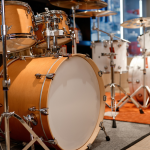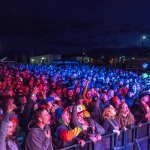Music marketing is a crucial aspect of building a successful career in the music industry. It involves promoting your music to reach the right audience, creating a strong fan base, and generating revenue from your music. Whether you’re a band, solo artist, songwriter, or producer, implementing effective music marketing strategies can make a significant difference in your success. In this comprehensive guide, we’ll explore the fundamentals of music marketing and provide you with essential tips and tools to kickstart your journey towards achieving your music goals.
1. What is Music Marketing?
Music marketing can be defined as the process of creating, promoting, and delivering music offerings that have value to your target audience. It involves activities such as creating music, communicating and sharing it with fans, delivering your music to various platforms, and exchanging your music offerings for value in return. Essentially, music marketing is about connecting with your audience, building a loyal fan base, and generating revenue from your music.
Creating music is the first step in music marketing. Whether you’re writing songs, producing music, or performing, your creative output forms the foundation of your music marketing efforts. The quality and uniqueness of your music will play a significant role in attracting and retaining fans.
Communicating and sharing your music is crucial in reaching your target audience. Utilizing various channels such as social media, websites, and music platforms, you can tell your story, showcase your music, and engage with your fans.
Delivering your music to fans and customers is another essential aspect of music marketing. This involves distributing your music to streaming platforms, online stores, physical retailers, and other channels where your audience can access and consume your music.
Lastly, music marketing involves exchanging your music offerings for value. Your fans provide value by consuming or purchasing your music, attending your shows, buying merchandise, or supporting you through crowdfunding platforms. In return, you provide value to your fans through your music, performances, and experiences.
2. The Importance of Music Marketing
In today’s music industry, talent and hard work alone are not enough to succeed. Music marketing is vital for several reasons:
- Reaching the Right Audience: Effective music marketing helps you connect with your target audience and make them aware of your music. By using targeted strategies and channels, you can reach the people who are most likely to appreciate and support your music.
- Building a Strong Relationship with Fans: Music marketing allows you to engage with your fans and build a loyal fan base. By sharing your story, interacting with fans on social media, and providing valuable content, you can foster a sense of community and loyalty among your audience.
- Increasing Revenue: Music marketing plays a significant role in generating revenue from your music. By promoting your music and creating multiple income streams such as streaming, downloads, merchandise sales, ticket sales, and licensing opportunities, you can monetize your music career effectively.
- Measuring Success: Through music marketing, you can track and measure your success as a musician. By analyzing metrics such as streams, downloads, sales, social media engagement, and website traffic, you can assess the effectiveness of your marketing efforts and make data-driven decisions to improve your strategy.
- Establishing Professionalism: Effective music marketing helps you establish yourself as a professional musician. By presenting your music and brand in a polished and cohesive manner, you can gain credibility and differentiate yourself from amateur musicians.
3. Digital vs. Traditional Music Marketing
In the past, traditional marketing methods like selling physical products (e.g., CDs, cassettes) and promoting through radio and television were prevalent in the music industry. However, with the rise of digital platforms and streaming services, the landscape of music marketing has shifted significantly. Here are some key differences between digital and traditional music marketing:
Traditional Music Marketing:
- Product: Traditional marketing focused on physical products like CDs, cassettes, and vinyl records.
- Price: The cost of physical products determined the price, and consumers would purchase them from retail stores.
- Place: Physical retail stores and music venues were the primary distribution channels for music products.
- Promotion: Traditional marketing relied on radio, television, print media, and physical promotional materials like posters and flyers.
Digital Music Marketing:
- Product: Digital music has become the primary product in the digital era, with streaming platforms and online music stores dominating the market.
- Price: Digital music can be sold at various price points, or it can be made available through streaming services with subscription models or ad-supported options.
- Place: Digital music can be accessed and purchased from online platforms such as Spotify, Apple Music, Amazon Music, and Bandcamp.
- Promotion: Digital marketing utilizes social media, online advertising, influencer collaborations, email marketing, and digital PR to promote music.
While traditional marketing methods still have their place in certain contexts, digital music marketing offers artists a broader reach and more targeted strategies to connect with their audience.
4. Creating a Marketing Strategy
A well-defined marketing strategy is crucial for effective music promotion. It helps you stay focused, set clear goals, and allocate resources effectively. Here are some steps to create a music marketing strategy:
1. Define Your Goals: Start by clearly defining your marketing goals. Do you want to increase your online presence, gain more followers, sell more music, or book more live shows? Setting specific and measurable goals will guide your marketing efforts and allow you to track your progress.
2. Identify Your Target Audience: Understand who your target audience is and what their preferences and interests are. This will help you tailor your marketing messages and strategies to resonate with your audience and attract their attention.
3. Craft Your Unique Selling Point: Differentiate yourself from other musicians by identifying your unique selling point (USP). What makes your music special? What sets you apart from other artists in your genre? Highlighting your USP will help you stand out and attract the attention of potential fans.
4. Develop a Brand Identity: Create a strong and consistent brand identity that aligns with your music and resonates with your target audience. This includes your artist name, logo, visual aesthetics, and overall tone and messaging. Your brand identity should be reflected in your website, social media profiles, album artwork, and promotional materials.
5. Utilize Online Platforms: Leverage online platforms to promote your music and engage with your audience. Create a professional website and optimize it for search engines. Establish a strong presence on social media platforms such as Facebook, Instagram, Twitter, and YouTube. Utilize streaming platforms like Spotify, Apple Music, and SoundCloud to reach new listeners.
6. Content Creation and Promotion: Create compelling and engaging content to attract and retain fans. This can include music videos, behind-the-scenes footage, live performances, interviews, and blog posts. Promote your content through social media, email newsletters, and collaborations with influencers and music tastemakers.
7. Engage with Your Audience: Building a strong relationship with your audience is essential for long-term success. Respond to comments and messages on social media, engage in conversations, and show appreciation for your fans. Offer exclusive content and incentives to your most loyal supporters.
8. Collaborate with Others: Collaborating with other musicians, influencers, and industry professionals can help expand your reach and introduce your music to new audiences. Seek out opportunities for joint performances, guest features on songs, and cross-promotion.
9. Track and Analyze Your Results: Regularly monitor and analyze your marketing efforts to see what’s working and what needs improvement. Use analytics tools to track your website traffic, social media engagement, streaming statistics, and sales data. Adjust your strategy based on the insights you gather.
Remember, effective music marketing is an ongoing process that requires consistent effort and adaptation. Stay updated with industry trends and continuously refine your strategies to stay ahead of the competition.
5. Music Marketing Platforms
In today’s digital age, numerous platforms and tools are available to help musicians promote their music effectively. Here are some popular music marketing platforms:
Ads Platforms:
- Social Media Ads: Platforms like Facebook, Instagram, and Twitter offer robust advertising tools that allow you to target specific demographics and reach a wide audience.
- YouTube Ads: YouTube offers various advertising options, including pre-roll ads, display ads, and sponsored cards, allowing you to promote your music videos and reach millions of viewers.
Streaming and Distribution Platforms:
- Spotify for Artists: Spotify provides a dedicated platform for artists to manage their music, access analytics, and promote their music through playlists and personalized recommendations.
- Apple Music for Artists: Apple Music offers a similar platform for artists to manage their music, access insights, and promote their music to Apple Music’s user base.
- Bandcamp: Bandcamp allows artists to sell and distribute their music directly to fans, offering a customizable storefront and various promotional tools.
Music Promotion Tools:
- Show.co: Show.co provides a suite of marketing tools for musicians, including social media campaigns, fan engagement features, pre-save campaigns, and landing pages.
- HearNow: HearNow enables artists to create customizable landing pages for their music releases, featuring audio players, links to streaming platforms, and promotional banners.
- Release Plan Generator: CD Baby’s Release Plan Generator helps artists plan and schedule their album releases, providing a step-by-step timeline and promotional tips.
Internet Radio and Playlisting:
- Internet Radio Airplay: CD Baby’s Internet Radio Airplay service allows artists to submit their music for airplay on internet radio stations, reaching new listeners and potential fans.
- Spotify Playlisting: Artists can submit their music directly to Spotify’s editorial team for consideration in the platform’s curated playlists, increasing the visibility and reach of their music.
These platforms and tools provide artists with valuable resources to promote their music, reach new audiences, and analyze the effectiveness of their marketing efforts.
6. The Components of a Music Marketing Plan
A well-structured music marketing plan is essential for guiding your promotional activities and maximizing your chances of success. Here are the key components of a comprehensive music marketing plan:
1. Situation Analysis: Begin by conducting a thorough analysis of your current situation and the music industry landscape. Identify your strengths, weaknesses, opportunities, and threats. Research your target audience, competitors, and industry trends.
2. Objectives: Define clear and measurable objectives for your music marketing campaign. These objectives should align with your overall career goals and be specific, achievable, and time-bound. Examples include increasing streaming numbers, gaining a certain number of followers on social media, or booking a specific number of live shows.
3. Strategy: Develop a strategy outlining how you will achieve your objectives. Define the key tactics and channels you will utilize to reach your target audience and promote your music effectively. Consider factors such as branding, content creation, advertising, social media engagement, and collaborations.
4. Tactics: Break down your strategy into specific tactics and action steps. Determine the content you will create, the platforms you will utilize, and the promotional activities you will undertake. Create a timeline and allocate resources to each tactic to ensure effective execution.
5. Action Plan: Create a detailed action plan outlining the tasks, responsibilities, and deadlines for each tactic. Assign roles to team members or collaborators and establish clear communication channels to ensure smooth coordination and execution.
6. Budget: Determine a realistic budget for your music marketing activities. Allocate funds to different tactics based on their potential impact and cost-effectiveness. Consider expenses such as advertising, content creation, graphic design, website maintenance, and professional services.
7. Evaluation and Measurement: Establish metrics and key performance indicators (KPIs) to track the progress and success of your music marketing efforts. Regularly evaluate the effectiveness of your tactics and adjust your strategy as needed based on the data and insights you gather.
8. Control and Review: Continuously monitor and review your music marketing plan to ensure alignment with your objectives and adapt to changes in the industry. Regularly review your budget, metrics, and results to optimize your strategy and maximize your return on investment.
By following these components, you can create a well-rounded music marketing plan that guides your promotional activities and helps you achieve your goals.
7. Music Marketing Tools
In the digital age, numerous tools and resources are available to assist musicians in their marketing efforts. These tools can streamline workflows, enhance productivity, and optimize promotional activities. Here are some essential music marketing tools to consider:
Social Media Management Tools:
- Hootsuite: Hootsuite is a social media management platform that allows you to schedule posts, monitor engagement, and analyze performance across multiple social media platforms.
- Buffer: Buffer is another popular social media management tool that enables you to schedule and publish posts, track engagement, and analyze data to optimize your social media strategy.
- Sprout Social: Sprout Social offers a comprehensive suite of social media management tools, including scheduling, monitoring, and analytics, to help you effectively manage your social media presence.
Email Marketing Tools:
- Mailchimp: Mailchimp is a widely used email marketing platform that allows you to create and send professional email campaigns, automate workflows, and analyze campaign performance.
- ConvertKit: ConvertKit is an email marketing tool specifically designed for creators, including musicians. It offers features like customizable opt-in forms, automated email sequences, and audience segmentation.
- Constant Contact: Constant Contact provides a user-friendly email marketing platform with customizable templates, list segmentation, and advanced analytics to help you engage with your email subscribers.
Analytics and Insights Tools:
- Google Analytics: Google Analytics is a powerful website analytics tool that provides detailed insights into your website traffic, user behavior, and audience demographics. It helps you track the effectiveness of your marketing campaigns and make data-driven decisions.
- Spotify for Artists Analytics: Spotify for Artists provides in-depth analytics and insights into your music’s performance on the platform. It allows you to track streams, listeners, playlists, and follower growth.
- Social Media Analytics Tools: Various social media platforms offer built-in analytics tools that provide valuable data on your audience engagement, reach, and demographics. Utilize these tools to assess the effectiveness of your social media marketing efforts.
Content Creation Tools:
- Canva: Canva is a user-friendly graphic design tool that enables you to create professional-looking visuals for your social media posts, album artwork, promotional materials, and more.
- Adobe Creative Cloud: Adobe Creative Cloud offers a suite of industry-standard design software, including Photoshop, Illustrator, and InDesign, for professional graphic design and multimedia creation.
- Squarespace: Squarespace is a website builder that provides visually appealing templates and intuitive editing tools, allowing you to create a professional website to showcase your music.
These are just a few examples of the many music marketing tools available. Explore different options, consider your specific needs, and choose the tools that best align with your goals and budget.
8. Leveraging Social Media for Music Marketing
Social media platforms can be powerful tools for music marketing, allowing you to reach a wide audience, engage with fans, and promote your music effectively. Here are some strategies for leveraging social media in your music marketing efforts:
1. Choose the Right Platforms: Identify the social media platforms that align with your target audience and genre. Focus your efforts on platforms where your audience is most active. Popular platforms for musicians include Facebook, Instagram, Twitter, YouTube, TikTok, and SoundCloud.
2. Create Engaging Content: Develop compelling and visually appealing content that resonates with your audience. This can include music videos, behind-the-scenes footage, live performances, interviews, and exclusive content. Experiment with different content formats to keep your audience engaged.
3. Consistency and Frequency: Maintain a consistent posting schedule to keep your audience engaged and build anticipation. Regularly share updates, new music releases, and behind-the-scenes content. However, be mindful not to overwhelm your audience with excessive posts.
4. Interact with Your Audience: Engage with your fans by responding to comments, messages, and mentions. Show appreciation for their support and create a sense of community. Encourage user-generated content by asking questions, running contests, or sharing fan artwork.
5. Collaborate with Influencers: Collaborating with social media influencers and music tastemakers can help expand your reach and introduce your music to new audiences. Seek out influencers who align with your genre and target audience and explore opportunities for collaborations or shoutouts.
6. Utilize Hashtags: Use relevant and popular hashtags to increase the visibility of your posts. Research trending hashtags in your genre and incorporate them strategically into your captions and comments. This can help your content reach a wider audience and attract new followers.
7. Paid Advertising: Consider allocating a portion of your marketing budget to paid advertising on social media platforms. Platforms like Facebook, Instagram, and YouTube offer robust advertising tools that allow you to target specific demographics and reach a wider audience.
8. Analyze and Optimize: Utilize social media analytics tools to track the performance of your posts, engagement metrics, and follower growth. Analyze the data to gain insights into what content resonates with your audience and adjust your strategy accordingly.
Remember, social media is a dynamic and ever-evolving landscape. Stay updated with platform changes, emerging trends, and new features to maximize your social media presence and effectively promote your music.
9. Building and Engaging Your Fanbase
Building a strong and engaged fanbase is crucial for long-term success in the music industry. Here are some strategies to help you connect with your fans and foster a loyal community:
1. Authenticity and Storytelling: Share your story and be authentic in your interactions with fans. People connect with genuine and relatable stories, so let your personality shine through your social media posts, interviews, and live performances.
2. Regular Communication: Keep your fans informed and engaged by regularly communicating with them. Utilize social media, email newsletters, and your website to share updates, new music releases, tour announcements, and behind-the-scenes content.
3. Exclusive Content and Experiences: Offer your fans exclusive content and experiences as a way to reward their loyalty. This can include exclusive music releases, early access to tickets, meet-and-greet opportunities, and limited-edition merchandise.
4. Fan Appreciation: Show appreciation for your fans’ support and make them feel valued. Respond to comments and messages, give shoutouts to dedicated fans, and acknowledge their contributions to your music journey.
5. Collaborative Projects: Involve your fans in collaborative projects to create a sense of community and ownership. This can include crowd-sourced album artwork, fan remix contests, or inviting fans to contribute ideas for music videos or merchandise designs.
6. Fan Events and Meetups: Organize fan events, meetups, or live streams to interact with your fans in person or online. This provides an opportunity to connect on a deeper level and strengthen the bond between you and your fans.
7. Utilize Fan Feedback: Listen to your fans’ feedback and take it into consideration. Conduct surveys, polls, or Q&A sessions to gather insights and involve your fans in decision-making processes.
8. Support Charitable Causes: Engage with your fans by supporting charitable causes that align with your values. This can include organizing charity concerts, donating proceeds from merchandise sales, or partnering with nonprofit organizations.
Remember, building a fanbase takes time and effort. Focus on creating meaningful connections, providing value to your fans, and nurturing a community that supports your music.
10. The Power of Email Marketing in Music Promotion
While social media and streaming platforms play a significant role in music marketing, email marketing remains a powerful tool for direct communication with your audience. Here’s why email marketing is essential for music promotion:
1. Direct Communication: Email allows you to communicate directly with your fans without relying on algorithmic algorithms or social media platform changes. You have control over your email list and can reach your audience with personalized messages.
2. Building a Fan Database: An email list serves as a valuable asset for your music career. It allows you to collect and store fan contact information, including email addresses, which can be used for targeted promotions, album releases, and tour announcements.
3. Personalized Content: Email marketing enables you to deliver personalized content to your fans. You can segment your email list based on factors such as location, interests, or purchase history and tailor your messages accordingly.
4. Album and Merchandise Sales: Email marketing is highly effective in promoting album releases, new merchandise, and exclusive offers to your fanbase. By sending targeted emails, you can drive traffic to your online store and boost sales.
5. Building Relationships: Email newsletters provide an opportunity to engage with your fans on a deeper level. Share behind-the-scenes stories, exclusive content, and personal updates to build a stronger connection with your audience.
6. Tour Announcements and Ticket Sales: Email marketing is an effective way to announce tour dates, sell tickets, and engage fans in specific locations. Segment your email list based on location and send targeted emails to fans in specific regions.
7. Analytics and Tracking: Email marketing platforms provide detailed analytics and tracking features. You can measure open rates, click-through rates, and conversions to evaluate the effectiveness of your email campaigns.
8. Automation and Drip Campaigns: Email marketing tools offer automation features that allow you to set up drip campaigns, welcome sequences, and automated follow-ups. This helps you nurture your audience and build relationships on autopilot.
To leverage the power of email marketing effectively, consider using an email marketing platform such as Mailchimp, ConvertKit, or Constant Contact. Build your email list through your website, social media, and live performances, and consistently deliver valuable content to your subscribers.
11. Promoting Your Music Videos
Music videos are a powerful tool for promoting your music and engaging your audience. Here are some strategies to effectively promote your music videos:
1. YouTube Optimization: YouTube is the primary platform for music video promotion. Optimize your YouTube channel and video metadata with relevant keywords, engaging titles, and compelling descriptions. Use eye-catching thumbnails to attract clicks.
2. Collaborate with Influencers: Collaborate with YouTubers, vloggers, or social media influencers who have a significant following and align with your genre. This can help you reach a wider audience and gain exposure to potential fans.
3. Cross-Promote on Social Media: Share snippets or teasers of your music videos on social media platforms to generate excitement and anticipation. Encourage your fans to like, share, and comment on your videos to increase engagement and reach.
4. Create Behind-the-Scenes Content: Share behind-the-scenes footage, making-of videos, or director’s commentaries to provide insights into the creative process behind your music videos. This content can be shared on social media, your website, or included as bonus features on physical releases.
5. Submit to Music Video Platforms: Submit your music videos to popular music video platforms such as Vevo, TIDAL, or Dailymotion. These platforms have dedicated audiences and can help expose your music videos to new viewers.
6. Collaborate with Visual Artists: Partner with visual artists or animators to create unique and visually captivating music videos. This can help differentiate your videos and attract attention in a crowded digital landscape.
7. Engage with Your Audience: Encourage your fans to participate in your music video promotion by asking them to create reaction videos, dance challenges, or cover versions of your songs. Feature fan-generated content on your social media or in future videos.
8. Paid Advertising: Consider allocating a portion of your marketing budget to paid advertising on YouTube or other platforms. Promote your music videos through pre-roll ads, display ads, or sponsored placements to reach a wider audience.
Remember to maintain consistency in your visual branding and storytelling across your music videos. Each video should contribute to your overall brand identity and enhance the connection with your audience.
12. Collaborating with Influencers and Music Tastemakers
Collaborating with influencers and music tastemakers can significantly expand your reach and expose your music to new audiences. Here’s how you can effectively collaborate with influencers:
1. Identify Relevant Influencers: Research and identify influencers in your genre or niche who have a significant following and engaged audience. Look for influencers whose values and aesthetic align with your brand and music.
2. Engage with Influencers: Follow, like, and comment on their social media posts to establish a genuine connection. Share their content and tag them when appropriate. Building a relationship before reaching out for collaboration increases your chances of success.
3. Offer Value: Provide influencers with something of value in exchange for their collaboration. This can include exclusive access to your music, concert tickets, merchandise, or financial compensation. Make sure the collaboration is mutually beneficial.
4. Collaborative Content: Collaborate with influencers on content creation. This can include guest features on their YouTube channels, Instagram takeovers, interviews, or joint live performances. Create unique and engaging content that aligns with both your brand and the influencer’s audience.
5. Contests and Giveaways: Partner with influencers to run contests or giveaways that involve your music or merchandise. This can help generate excitement, increase engagement, and attract new fans.
6. Sponsored Posts: Consider sponsoring influencers’ social media posts or stories to promote your music. This can provide additional exposure and reach a wider audience.
7. Music Tastemakers: Collaborate with music tastemakers such as bloggers, journalists, and radio hosts who have a significant influence on music discovery. Share your music with them, offer interviews or exclusive content, and seek opportunities for features or reviews.
8. Maintain Relationships: Once a collaboration is complete, maintain relationships with influencers and tastemakers. Engage with their content, share their work, and continue to support each other in mutually beneficial ways.
Remember, effective collaborations require genuine connections and a shared vision. Be selective in choosing influencers who resonate with your music and can introduce you to new fans who will appreciate your art.
13. Public Relations and Media Outreach
Public relations (PR) plays a crucial role in building awareness and credibility for your music. Here are some strategies for effective PR and media outreach:
1. Develop a Press Kit: Create a professional press kit that includes your bio, high-resolution photos, music samples, press releases, and any notable achievements or reviews. Make it easily accessible on your website for journalists and bloggers.
2. Write Compelling Press Releases: Craft concise and attention-grabbing press releases for significant announcements such as album releases, music videos, or tour dates. Send these releases to relevant media outlets, journalists, and bloggers.
3. Build Media Relationships: Establish relationships with journalists, music bloggers, and radio hosts who cover your genre or local music scene. Engage with their work, share their articles, and provide them with exclusive content or interviews.
4. Submit to Music Blogs and Magazines: Research and submit your music to relevant music blogs, online magazines, and digital playlists. Follow their submission guidelines and personalize your pitch to increase your chances of being featured.
5. Pitch for Interviews and Features: Reach out to journalists and podcast hosts to pitch yourself for interviews, features, or guest appearances. Highlight your unique story, recent achievements, or upcoming projects to capture their interest.
6. Live Performances and Showcases: Participate in music festivals, industry conferences, and local showcases to increase your visibility and attract media attention. Network with journalists, bloggers, and industry professionals at these events.
7. Utilize Online PR Services: Consider utilizing online PR services such as PRWeb, Hypebot, or SubmitHub to distribute your press releases, music, and promotional materials to a broader audience and increase your chances of media coverage.
8. Monitor and Respond to Press Coverage: Regularly monitor media coverage of your music and engage with journalists and bloggers who write about you. Share positive articles on your social media, comment on articles to show appreciation, and build relationships with journalists who support your career.
Remember, building relationships with the press takes time and persistence. Be respectful, professional, and genuine in your interactions, and focus on providing value to journalists and bloggers.
14. Analyzing and Measuring your Music Marketing Efforts
Analyzing and measuring your music marketing efforts is crucial for making data-driven decisions and optimizing your strategy. Here are some key metrics and tools to help you track and evaluate your marketing performance:
1. Website Analytics: Utilize tools like Google Analytics or similar platforms to track website traffic, user behavior, and audience demographics. Measure metrics such as page views, bounce rate, time on site, and conversion rates to assess the effectiveness of your website and promotional campaigns.
2. Social Media Analytics: Most social media platforms offer built-in analytics tools that provide valuable insights into your audience
Author Profile

- Jasper Jones, hailing from Newfoundland, Canada, is a seasoned music marketing professional. He played a crucial role in Youngboy NBA's breakthrough with the mixtape "Until Death Call My Name" in 2018. Recently, he collaborated with Charmaine, executing a successful marketing campaign for her debut single "Bold" on SoundCloud. This propelled Charmaine's career, earning her a spot in the exclusive "First on SoundCloud" program. Jasper's track record and passion make him a powerful force in music marketing, driving artists to lasting success.
Latest entries
 Sync LicensingOctober 12, 2023The Complete Guide to Sync Licensing: What It Is, How to Prepare, the Process, and Where to Submit
Sync LicensingOctober 12, 2023The Complete Guide to Sync Licensing: What It Is, How to Prepare, the Process, and Where to Submit Booking ShowsOctober 5, 2023Booking a Hip Hop Show in 2023: An In-Depth, Unfiltered Guide
Booking ShowsOctober 5, 2023Booking a Hip Hop Show in 2023: An In-Depth, Unfiltered Guide Music MarketingOctober 4, 2023Targeting Your Niche: A Practical Guide to Finding Your Audience
Music MarketingOctober 4, 2023Targeting Your Niche: A Practical Guide to Finding Your Audience Guerilla MarketingOctober 1, 2023Amplify Your Sound: How Guerrilla Marketing Can Grow Your Local Music Scene
Guerilla MarketingOctober 1, 2023Amplify Your Sound: How Guerrilla Marketing Can Grow Your Local Music Scene


0 Comments